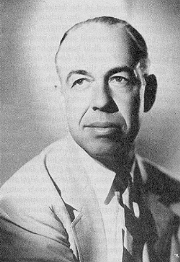 The composer Roy Webb was born in New York City on October 3, 1888. The main musical influence in his life was his mother, who frequently took him as a boy to the Metropolitan Opera; and an uncle who was a well-known Gilbert and Sullivan favorite ensured that he had a thorough grounding in comic opera as well. Webb was also gifted as an artist and studied drawing and painting at the Art Students' League in New York for five years. After high school he enrolled at Columbia University where he was fed a diet of Bach and Beethoven: his teacher used Bach fugues as a basis for his instruction, and Web would have cause to be grazteful for the rigor of this early training when, years later, he faced the problem of writing "symphonic" music for films.
The composer Roy Webb was born in New York City on October 3, 1888. The main musical influence in his life was his mother, who frequently took him as a boy to the Metropolitan Opera; and an uncle who was a well-known Gilbert and Sullivan favorite ensured that he had a thorough grounding in comic opera as well. Webb was also gifted as an artist and studied drawing and painting at the Art Students' League in New York for five years. After high school he enrolled at Columbia University where he was fed a diet of Bach and Beethoven: his teacher used Bach fugues as a basis for his instruction, and Web would have cause to be grazteful for the rigor of this early training when, years later, he faced the problem of writing "symphonic" music for films.
His first professional engagement and Broadway debut came when he was still a student at Columbia with the invitation of herbert Stothart (later of MGM) to work on Wildflower. He was soon an artistic director at the New York Players' Studio and Victor Baravalle booked him to conduct the Fred Stone musical Stepping Stone, which ran in New York and on tour for two and a half years. Baravalle, now Musical Director at RKO, then invited him to come to Hollywood to help orchestrate the score for Rio Rita (1929). Also at RKO at this time was Max Steiner, Webb's almost exact contemporary. Webb arrived in hollywood in 1929 and spent virtually the remainder of his working life in the employ of RKO until the early fifties when the studio ceased production and was sold to Desilu TV. Over a period of some twenty-five years he worked in one capacity or another on a total of over 300 films.
His work paralleled Steiner's in that he was involved with musicals in his early years, but gradually, as he began to develop as a composer, became monopolized by feature films. He still did the occasional musical, shorts subjects, occasionally wrote songs, and his Broadway experience enabled him to handle comedy and light drama. Webb's real forte, however, was the genre known as film noir as it evolved in the 1940s. The film noir, the gangster film, the thriller, the horror film; all individual flowerings from a common stem, all intricately interrelated, such films attained a peak of excellence in the Hollywood of the forties.
His feeling for the particular type of mood associated with film noir is well demonstrated in Edward Dmytryk's celebrated Murder, My Sweet (1944), the film that first established Dick Powell as a "straight" actor. Webb also made a valuable contribution to the series of low-budget horror films produced by Val Lewton--films acclaimed by James Agee and others since then as masterpieces of the genre. Webb was the Lewton composer par excellence; Cat People (1942), I Walked with a Zombie (1943), The Leopard Man (1943), The Seventh Victim (1943), Curse of the Cat People (1944), The Body Snatcher (1945), and Bedlam (1946). Webb's "horror" music is the precise aural equivalent of Lewton's half-heard shounds, half-seen shadows, and atmospheric lighting.
Much influenced by Lewton--and by German expressionism--is Robert Siodmak's The Spiral Staircase (1946), one of the best film noir of the forties, and one of Webb's best scores. Webb's most famous film was Notorious (1946), by Alfred Hitchcock. Webb described his score for Notorious as one of which he was "very proud," and with good reason. In Crossfire (1947), one of the supreme achievements of RKO in the forties, much less music is employed than in Notorious, but not a note is wasted. Webb also created the eloquent music for Robert Mitchum in the now-celebrated Out of the Past (1947). Fritz Lang's Clash by Night (1952) was another picture with an arresting main title and sparing use of music elsewhere. And in 1948 Webb scored The Window, a film now recognized as a masterpiece.
Pictures such as George Stevens' I Remember Mama (1948), John Cromwell's The Enchanted Cottage (1945), and Rachel and the Stranger (1948) appealed to a warmly romantic, even sentimental streak in Webb's nature. When RKO was disbanded in 1955 Webb continued to work as a free-lancer; and, happily, one of his post-RKO pictures turned out to be one of the biggest successes of the fifties, and Webb's last major score. This was Marty (1955). Webb was a shy, gentle man, modest and self-effacing to a fault; but the quality of his best work can compare favorably with that of his more feted colleagues. Roy Webb died in hospital in Santa Monica in December 1982 at the age of 94.
--CHRISTOPHER PALMER, from
The Composer in Hollywood.